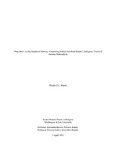| dc.rights.license | In Copyright | en_US |
| dc.creator | Marsh, Wayde Zachary C. | |
| dc.date.accessioned | 2013-04-10T15:35:49Z | |
| dc.date.available | 2013-04-10T15:35:49Z | |
| dc.date.created | 2013 | |
| dc.identifier | WLURG38_Marsh_REL_2013 | |
| dc.identifier.uri | http://hdl.handle.net/11021/23846 | |
| dc.description | Thesis; [FULL-TEXT RESTRICTED TO WASHINGTON AND LEE UNIVERSITY LOGIN] | en_US |
| dc.description | Wayde Zachary C. Marsh is a member of the Class of 2013 of Washington and Lee University. | en_US |
| dc.description.abstract | This paper seeks to investigate and provide renewed clarity to the ways Johann Gottfried Herder's (1744-1803) theory of nationalism is contested by using more modern theories of 'nation' and 'religion.' Using Benedict Anderson's theory of the 'nation' as an "imagined community" and Ѐmile Durkheim's theory of 'religion' as an essentially social phenomenon, this paper interprets Herder's nationalism in a new way in order to promote an alternate path for his theory. Herder's language often drives scholars to focus on the ways in which his theories and language contribute to German nationalism of the 20th century and the anti-Jewish policies that arose with it. However, when viewed through its relationship to religion, Herder's nationalism instead moves humankind toward a utopian vision of world harmony through diversity. As a thinker of the German Enlightenment, Herder is primarily concerned with imagining the German nation in his own time, a project that depends upon thorough treatment of the natural cultural, not ethnic, facts that define such a nation. It is through Herder's complex theories of the relationships between thought, language, religion, poetry, education, and history that he develops this vision for Humanität, 'humanity.' Religion, in particular, enhances the organic, as opposed to fabricated, development of national identity. If this identity sufficiently expresses a nation's experience with their concept of the sacred, it drives a nation to seek not destruction and chauvinism, but rather peaceful interaction and coexistence in the 'Garden of Nations.' | en_US |
| dc.description.statementofresponsibility | Wayde Z.C. Marsh | |
| dc.format.extent | 61 pages | en_US |
| dc.language.iso | en_US | en_US |
| dc.rights | This material is made available for use in research, teaching, and private study, pursuant to U.S. Copyright law. The user assumes full responsibility for any use of the materials, including but not limited to, infringement of copyright and publication rights of reproduced materials. Any materials used should be fully credited with the source. | en_US |
| dc.rights.uri | http://rightsstatements.org/vocab/InC/1.0/ | en_US |
| dc.subject.other | Washington and Lee University -- Honors in Religion | en_US |
| dc.title | 'Pure Dew' on the Garden of Nations: Unearthing Johann Gottfried Herder's Religious Vision of German Nationalism (thesis) | en_US |
| dc.type | Text | en_US |
| dcterms.isPartOf | RG38 - Student Papers | |
| dc.rights.holder | Marsh, Wayde Zachary C. | |
| dc.subject.fast | Durkheim, Émile, 1858-1917 | en_US |
| dc.subject.fast | Herder, Johann Gottfried, 1744-1803 | en_US |
| dc.subject.fast | Nationalism | en_US |
| dc.subject.fast | Germany | en_US |
| local.department | Religion | en_US |
| local.scholarshiptype | Honors Thesis | en_US |
